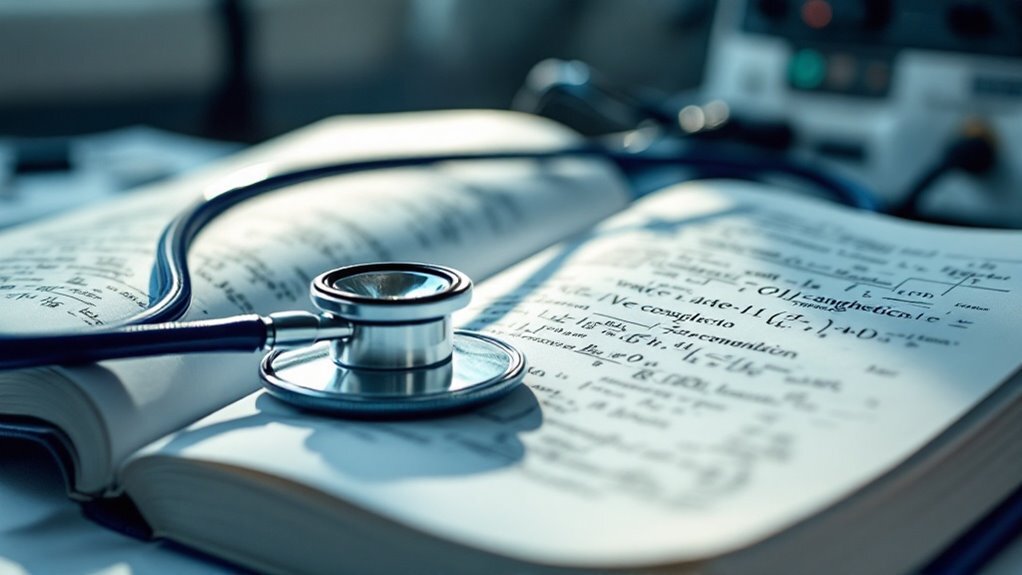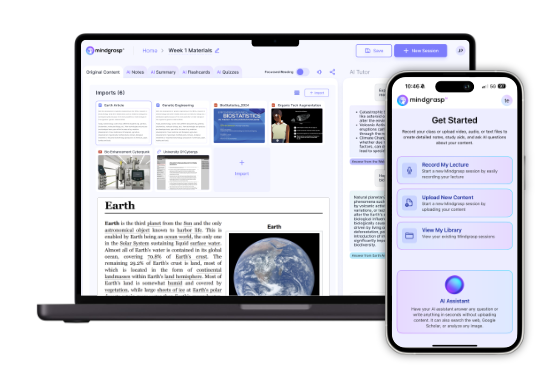
To get into medical school, you need at least two semesters of college-level physics! Sorry, no AP credits here!
You'll study cool stuff like mechanics, electromagnetism, and thermodynamics. Plus, hands-on lab work is a must, typically 8 semester credits worth. This helps you connect theory with real-life applications, like understanding how blood flows!
If you want to know more about specific topics or what schools might accept, just stick around!
Key Takeaways
- Medical schools typically require two semesters of college-level physics with lab components, excluding AP credits.
- Essential topics include mechanics, electromagnetism, thermodynamics, and their applications in medicine.
- Laboratory experience is crucial, requiring a minimum of 8 semester credits of hands-on lab work.
- Strong mathematical skills, particularly in calculus, are necessary for understanding physics concepts vital for medical studies.
- Different schools may have varying policies on accepted courses and minimum GPA requirements for physics credit.
Boost Your GPA Faster with Mindgrasp
Instantly turn your class notes into smart summaries, flashcards, and quizzes—study less, learn more, and ace your exams.
Try it FreeCore Physics Coursework Requirements
When you're gearing up for medical school, you might wonder about the core physics coursework requirements. Most schools want two semesters of college-level physics—no AP credits allowed!
Preparing for medical school? Remember, you'll need two semesters of college-level physics—AP credits won't cut it!
You'll explore topics like:
-
Mechanics (think forces and energy)
-
Electromagnetism (hello, circuits!)
-
Thermodynamics (ever heard of entropy?)
These core physics concepts are vital for medical admissions and prepping for the MCAT.
Plus, you'll often need some math, like calculus or stats, alongside. So, buckle up—these courses are essential for understanding the science behind medicine. It might sound tough, but you’ve got this! Additionally, utilizing tools like Mindgrasp's accurate notes can enhance your study efficiency and comprehension.
Laboratory Experience Mandates
When it comes to lab requirements for medical school, getting hands-on experience is super important.
You’ll usually need to complete a full year of physics with lab components, which helps you connect theory to practice.
Required Lab Coursework
Getting into medical school isn’t just about acing your classes; you’ve also got to meet some specific lab coursework requirements!
You need a minimum of 8 semester credits that include hands-on lab work. Here’s what you should know:
-
Lab components are mandatory—no exceptions!
-
Only courses from accredited colleges count (sorry, community college).
-
Check specific schools—like Harvard or Georgetown—for their unique lab credit rules.
Hands-On Experimentation Importance
Hands-on experimentation is crucial for understanding physics in the medical field, as it connects theory to real-life applications. Engaging in hands-on learning helps you grasp concepts like biomechanics and imaging techniques. Here’s a quick overview of the benefits:
| Benefit | Description | Example |
|---|---|---|
| Application of Concepts | Bridges textbook learning | Using physics in imaging |
| Real-World Complexity | Adapts to dynamic healthcare settings | Troubleshooting equipment |
| Skill Development | Enhances practical skills | Interpreting imaging results |
| Regulatory Standards | Meets accreditation requirements | Fulfilling program mandates |
| Confidence Boost | Increases problem-solving abilities | 75.51% confidence boost |
This hands-on approach is essential for success in medical school!
Try Mindgrasp for Free!
Experience an easier, faster way to boost your GPA. Sign up now to try Mindgrasp AI for free and see how AI-powered learning transforms your study routine.
Try it FreeEssential Physics Topics for Medical Students
As you plunge into the world of medicine, understanding some key physics concepts can really help you out—like, seriously!
Here are a few essential topics you should know:
-
Newton's Laws: They help you grasp how forces affect the body, like with blood flow.
-
Thermodynamics Applications: Get familiar with energy conservation and heat transfer—it’s vital for treating fevers and hypothermia.
-
Quantum Mechanics: This might sound fancy, but it’s key in imaging tech, like MRI.
Focusing on these areas will make your medical journey smoother, and hey, you might even impress your classmates!
Credit Substitution Policies Across Schools
When you're looking at credit substitution policies, it’s good to know how different schools handle things like calculus courses and community college credits.
Some might accept your community college classes with open arms, while others could be a bit pickier (don’t you just love that?).
Calculus Course Substitution
If you’re gearing up for med school, you might be relieved to know that calculus isn’t always a must-have. Many schools allow calculus alternatives, like biostatistics or introductory statistics, to meet your quantitative requirements.
Here’s the scoop:
-
Statistics emphasis: It’s often preferred because it’s more relevant to medical research.
-
AP credits work: If you scored well in AP calculus or statistics, they might count!
-
Flexibility: Some schools waive calculus if your major had it covered.
Community College Acceptance
Steering through community college credits can feel a bit tricky, but don’t worry—most med schools have policies that make it easier than you think!
If your physics courses come from regionally accredited institutions, they’re likely to be accepted. Here’s what you should know:
-
Many schools need two semesters of physics.
-
A minimum GPA of 3.0 is often expected.
-
Some prefer courses from four-year colleges, but accredited community college credits usually work.
-
AP credits might substitute, too!
Importance of Mathematical Skills in Physics
Mathematical skills mightn't seem like the most exciting part of physics, but they’re absolutely essential for understanding the subject. You see, math forms the backbone of physics concepts, acting as the language we use to solve problems.
-
Calculus helps explain motion and energy.
-
Algebra and geometry let you interpret equations.
If your math skills are shaky, you’ll find physics challenging. Strong math skills boost your analytical skills, making it easier to tackle MCAT questions and real-world medical problems.
Relevance of Physics in Medical Practice
Physics plays a massive role in medical practice, shaping the way we diagnose and treat patients every day.
Think about it—imaging technologies like MRI and CT scans help us see inside the body, while ultrasound detects soft tissue issues. These are essential diagnostic tools!
Then there’s therapeutic physics, which guarantees safe and effective treatment planning. You want patient safety, right? That's where radiation management comes in, balancing the benefits while minimizing risks.
Therapeutic physics ensures patient safety through effective treatment planning and careful radiation management, balancing benefits with risks.
Medical innovations constantly evolve, driven by physics, making healthcare smarter and more precise.
Recommended Additional Physics Topics for Aspiring Physicians
When you think about becoming a physician, it’s easy to focus solely on biology and chemistry, but don’t forget about physics!
Here are some advanced physics topics with cool interdisciplinary applications you should consider:
-
Fluid dynamics: Understand blood flow and heart mechanics.
-
MRI physics: Explore how magnetic fields create images.
-
Electrophysiology: Immerse yourself in nerve signals and muscle functions.
-
Radiation oncology: Learn about tumor-targeting techniques.
These subjects not only enhance your medical knowledge but also sharpen your critical thinking skills.
Conclusion
So, as you gear up for medical school, remember this: "Knowledge is power." Mastering physics isn’t just about passing classes—it’s about understanding how the body works. Whether you're exploring waves or learning about forces, each concept strengthens your medical knowledge. Plus, don’t forget those labs! They’re hands-on fun (and super important). So immerse yourself in those physics courses and engage with the material. You’ve got this—your future patients will thank you for it!
Download Mindgrasp from the App Store
Access Mindgrasp at your desk for in-depth research and writing projects, or use the mobile version to easily access your content on-the-go or record live lectures.
Download the iOS App
